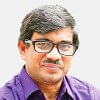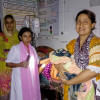The silent emergency: Politicisation of our healthcare sector

After the July uprising, Bangladesh now stands at the threshold of a new era. It has ignited dreams of a new Bangladesh in the public consciousness—a Bangladesh where progress, justice, and inclusivity will be ensured in every sector. In the context of this transformation, the healthcare sector and the role of health professionals demand renewed scrutiny. A fundamental question arises repeatedly: Are the doctors, entrusted with the critical responsibility of saving lives, able to uphold the dignity, ethics, and humanistic values of their profession? Or has the growing influence of politics become an invisible barrier to fulfilling this responsibility?
The medical profession is not merely a job or a source of income. It is a radiant symbol of humanity. To a doctor, a patient's life is the most valuable asset. Their duty extends beyond curing diseases to becoming beacons of trust, empathy, and hope. Organisations established to protect the dignity of this profession and the rights of doctors were meant to ensure professional welfare. However, regrettably, these organisations have fallen prey to political influence, deviating from their original objectives. Many medical organisations are directly or indirectly linked to some political party. Their activities are no longer focused on safeguarding doctors' interests but have become tools for political parties to expand influence and maintain dominance.
This political influence profoundly impacts every level of a doctor's professional life. Postings, promotions, and transfers—which should be determined based on a doctor's merit, experience, and professional competence—are now contingent on political interference. A doctor's career advancement depends more on political loyalty than on qualifications.
Bangladesh's medical community is among the most talented and respected segments of society. Their knowledge, skills, and dedication form the backbone of the healthcare sector. They become rays of hope in society's most critical moments. However, political divisions and partisan conflicts have deprived many qualified doctors of leadership opportunities. This division not only affects their professional lives but also weakens their social standing. Governance in the healthcare sector is being disrupted, and public trust in doctors is steadily declining. The erosion of a doctor's image is not just a personal loss, it has become a political liability for the associated political parties.
The impact of this political influence is not confined to doctors. It casts a dark shadow over the entire healthcare sector. The public now perceives doctors as politically influenced rather than patient-centric. This crisis of trust is particularly alarming because access to quality healthcare is already a significant challenge for ordinary Bangladeshis. Limited healthcare infrastructure in rural areas, shortages of doctors and nurses, and high treatment costs have already made healthcare access difficult. The erosion of trust in doctors amidst these challenges is creating an even greater crisis for the healthcare sector.
Furthermore, the lack of merit-based leadership is hindering innovation and reform in the healthcare sector. Bangladesh's population is growing, and with it, the demand for healthcare services is increasing. However, political influence has made long-term planning and effective policy implementation nearly impossible. Various political parties, such as the BNP, have proposed ambitious healthcare reforms. The BNP's 31-point plan is one such example. But a fundamental prerequisite for implementing these proposals is establishing an accountable, professional, and politically neutral healthcare system. Without meeting this condition, these plans will remain mere paper promises.
What is the way out of this crisis? The medical community must embark on a path of self-assessment. Their organisations may be politically aware, but their primary loyalty must lie with the profession's ethics, independence, and interests. This requires fostering a culture of constructive dialogue. Doctors should engage in open discussions to identify their challenges and seek solutions. It must be remembered that the people of this country do not favour doctors engaging in politics, as evidenced by a recent survey by Bangladesh Bureau of Statistics (BBS). Through such dialogue, the medical community can restore public trust in the profession.
One possible solution could be nurturing a new generation of leadership—leadership free from political influence and committed to professionalism and humanity. Such leadership could usher in a new era in the healthcare sector, a system where patient care is the highest priority. By breaking free from political influence, doctors can reclaim their true role as healers and advocates for well-being.
The depoliticisation of the medical profession is not only significant within the profession. It holds national importance. A healthcare system free from political influence can become a cornerstone of national good governance. It would demonstrate that Bangladesh is capable of building institutions dedicated to public service rather than serving political elites. For doctors, this is a historic opportunity to redefine their legacy. They are not pawns in a political game but can be torchbearers of a healthier, just, and prosperous future.
As Bangladesh moves forward through its new reality, the medical profession stands at a crossroads. This is not a time for stagnation. What is needed now is self-assessment, constructive dialogue, and bold action. The dream of a new Bangladesh built on justice, accountability, and humanity depends on this renaissance in the medical profession. The responsibility to turn this dream into reality now rests in the hands of the medical community.
However, the question remains: What should the state do in this regard? Articles 15 and 18 of the constitution recognise healthcare as a fundamental right. Thus, if political influence or partisan involvement in the healthcare sector goes against the public interest, it amounts to a failure to fulfil the state's constitutional obligations.
In this context, the government, in collaboration with the BMDC, could conduct an online poll to ascertain whether doctors support or oppose engaging in partisan politics. We firmly believe that, except for a handful of doctors seeking or enjoying privileges, the majority wish to break free from the cycle of partisan politics.
However, the state's primary responsibility is to prevent the infiltration of partisan politics into the medical profession through strict enforcement of the law. According to the Government Servants Ordinance of 1979, government and semi-government employees are legally prohibited from participating in partisan politics. This provision applies equally to the healthcare sector, and the state must take a firm stance to enforce it. In particular, those actively involved in partisan politics should be barred from participating in Bangladesh Medical Association (BMA) elections or securing appointments in government or government-funded healthcare institutions—a moral and legal duty of the state.
Additionally, the state must undertake a coordinated, cross-party initiative where all political parties agree on a common policy to keep the healthcare and public health sectors free from partisan politics. To this end, the state's top leadership, particularly the chief adviser or relevant policymakers, must engage in discussions with political parties to formulate a realistic reform agenda. Ensuring sustainable reforms in the healthcare sector in the public interest requires political neutrality, professional transparency, and good governance, underpinned by resolute state-led action.
Dr Syed Abdul Hamid is professor at the Institute of Health Economics of Dhaka University and convener at Alliance for Health Reforms Bangladesh (AHRB).
Views expressed in this article are the authors' own.
Follow The Daily Star Opinion on Facebook for the latest opinions, commentaries and analyses by experts and professionals. To contribute your article or letter to The Daily Star Opinion, see our guidelines for submission.

 For all latest news, follow The Daily Star's Google News channel.
For all latest news, follow The Daily Star's Google News channel. 







Comments